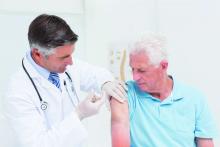Only minimal improvements have been made in vaccination coverage among U.S. adults in recent years, reported Walter W. Williams, MD, of the National Center for Immunization and Respiratory Diseases, Atlanta, and his associates.
In an analysis of data from the 2015 National Health Interview Survey, the researchers looked at adult vaccine coverage for influenza, pneumococcal, tetanus, hepatitis A, hepatitis B, herpes zoster, and human papillomavirus. Although vaccine coverage rose in several of the seven vaccines studied from 2014 to 2015, these were small increases, they noted (MMWR Surveill Summ. 2017 May 5;66[11]:1-28).
For influenza, vaccination coverage was 44.8% for the 2014-2015 season, an increase of 1.6% from the previous season. Pneumococcal vaccination coverage was 23% overall among adults aged 19-64 years at increased risk for pneumococcal disease in 2015, a 2.8% increase from 2014; for adults aged 65 years and older, coverage was 63.6%, similar to the 2014 estimate. In adults aged 19 years and older who received Tdap vaccination in 2015, coverage was 23.1% – a 3.1% increase compared with 2014.Two or more doses of hepatitis A vaccination coverage in 2015 was 9% for adults aged 19 years or older, similar to the estimate for 2014. Three or more doses of hepatitis B vaccination coverage among adults was 24.6% for adults aged 19 years or older in 2015, similar to that in 2014. However, hepatitis B vaccination coverage among health care providers aged 19 years and older was 64.7%, a 4.1% increase compared with 2014.
In women aged 19-26 years, 41.6% received at least 1 dose of human papillomavirus vaccine in 2015, similar to that reported for 2014. In adults aged 60 years and older, 30.6% reported receiving herpes zoster vaccination to prevent shingles in 2015, 2.7% higher than in 2014.
The results showed that racial and ethnic differences in vaccine coverage persisted for all vaccines researched in this report, with higher coverage for whites compared with most other groups such as African Americans and Hispanics. The differences widened for vaccines such as pneumococcal and herpes zoster. Whites also reported receiving vaccinations more often than other groups, the researchers said.
The data in this report are subject to some limitations, such as exclusion of people in the military and those residing in institutions. Self-report of vaccination may be subject to recall bias, as young adults likely are not able to remember accurately the number of vaccines they’ve received as children or as adults, the researchers noted.
The awareness of the need for vaccines by adults is low among the general population. Health care provider recommendations for vaccinations are strongly associated with a patient’s receiving vaccines. Integrating assessment of adult patients’ vaccination needs, recommendations, and offers of vaccination as a part of routine adult clinical care could greatly improve the adult vaccination rate, according Dr. Williams and his associates.
No conflict of interest was reported.


